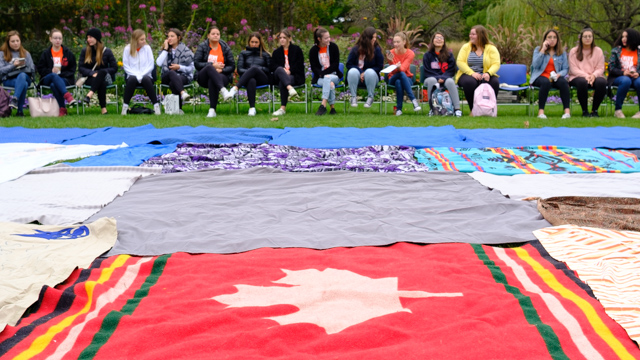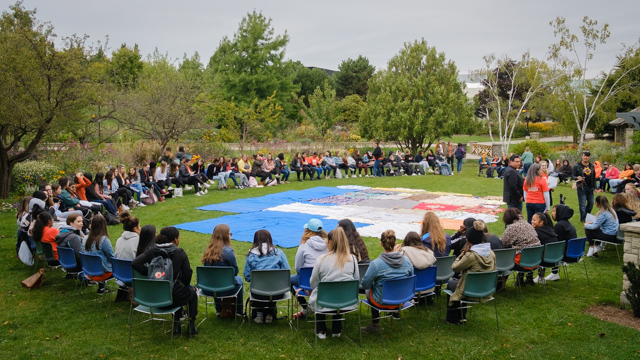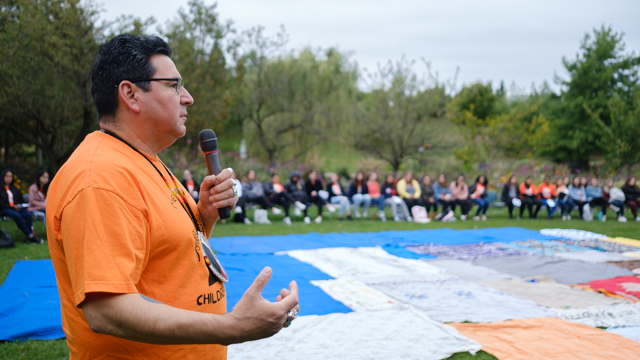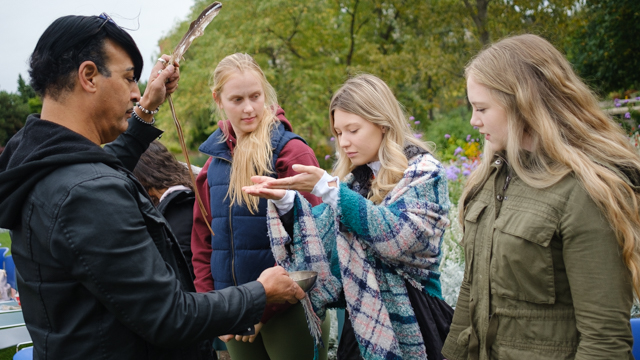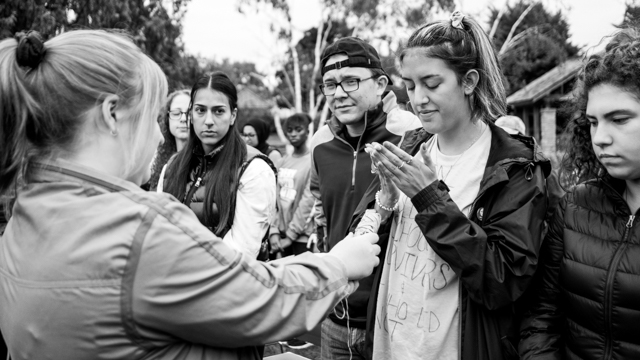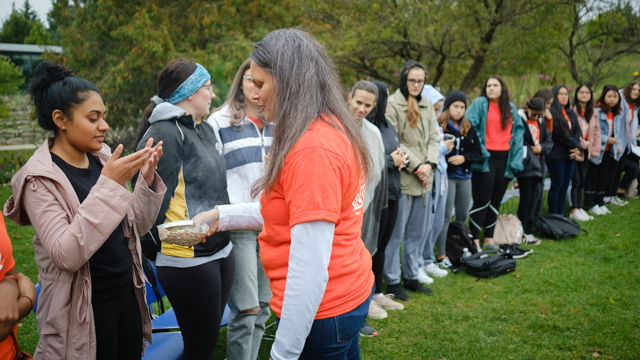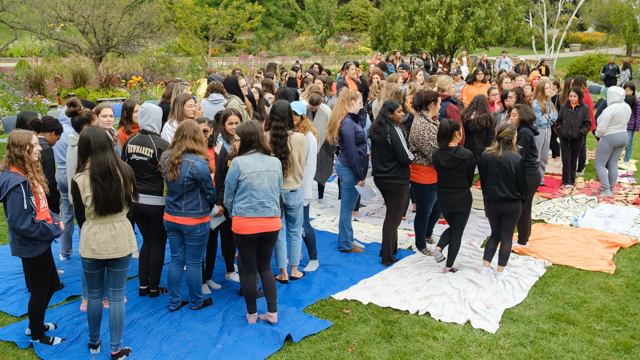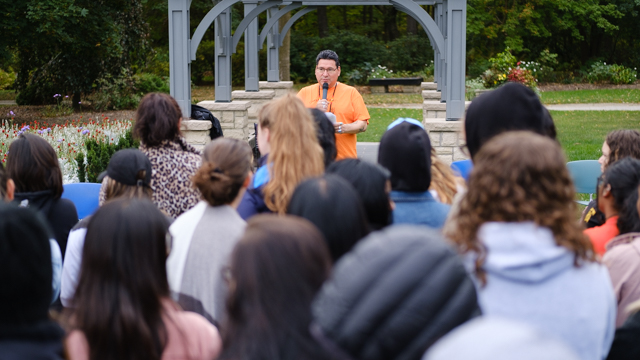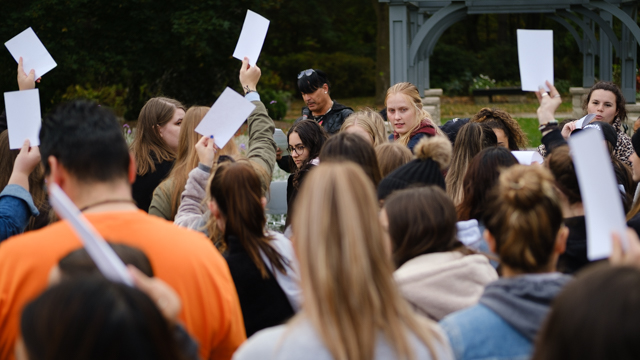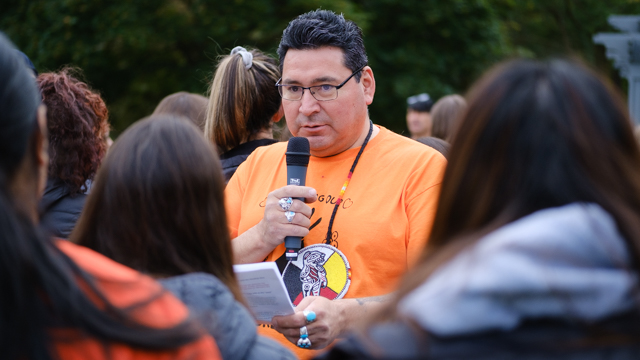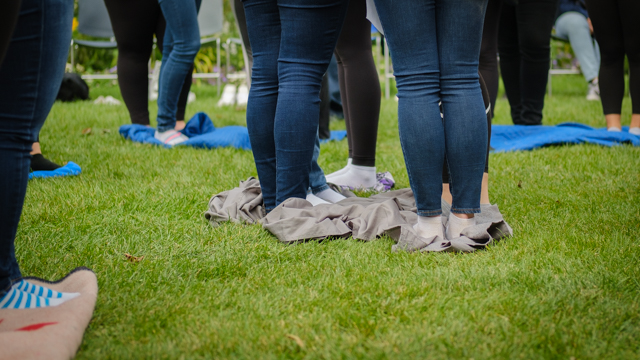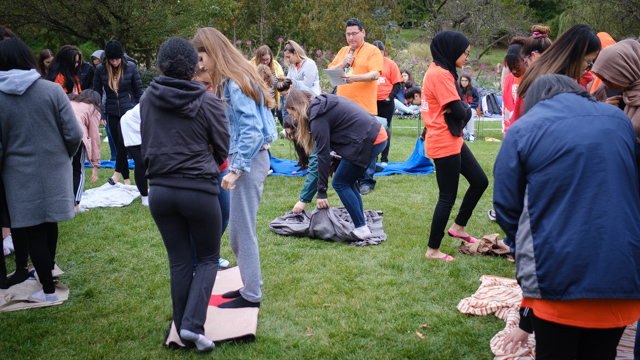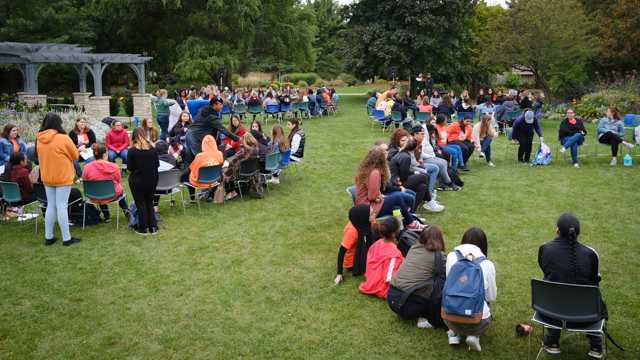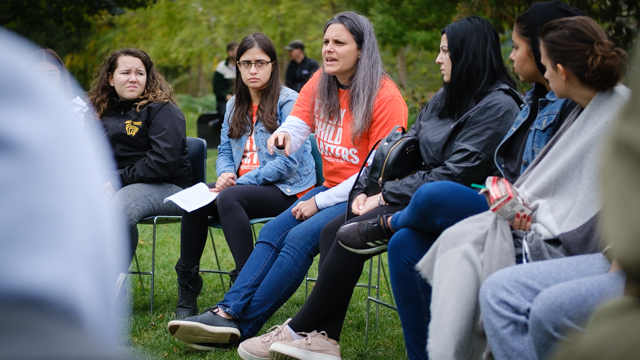UofGH ECS students honour Orange Shirt Day
On September 30, 2019, over 100 students, staff, and faculty from University of Guelph-Humber’s Early Childhood Studies (ECS) program gathered at the Humber Arboretum for a special ceremony to commemorate Orange Shirt Day: Every Child Matters. Orange Shirt Day is an annual, Canada-wide initiative to raise awareness about Indigenous history, and the residential school system’s impact on Indigenous children and families.
The idea for the event came from ECS instructor Christine Zupo, who teaches the Introduction to Indigenous Studies course. ‘We’re always looking for opportunities for students to engage more with the Indigenous perspective and understand our history, so we thought it was a great idea,” says Dr. Nikki Martyn, Program Head of ECS.
KAIROS Blanket Exercise
The event began with a smudging ceremony facilitated by Bear Standing Tall – founder of Bear Standing Tall Corporate Training (BSTCT), which specializes in Indigenous cultural awareness training. Afterward, Bear Standing Tall led a moving and impactful KAIROS Blanket Exercise – which interactively took participants through the history of Indigenous people on Turtle Island, as Canada was known before European settlement. Students stood on blankets that represented the Indigenous people’s land before European settlers arrived. As history was recounted, people stepped off the blankets, and blankets were folded, separated, and reduced, to represent the Indigenous peoples who died and the land lost throughout history.
“What’s impactful about this particular experience is that we may learn about Indigenous history in school, but to see and have an experience where we’re actually being told how many children died, and we’re acting as those children, it makes it more real - it’s not just a story, it’s something that actually happened,” says Dr. Elena Merenda, Assistant Program Head of ECS. “It’s something you’ll remember - you don’t always remember something that is lectured to you in a classroom, but an experience like this you take with you.”
Following the Blanket Exercise, students split into four talking circle groups, where they shared their thoughts on the blanket ceremony and its impact. They then reconvened into the large group and shared their thoughts with everyone.
The ceremony greatly impacted those who attended. “This ceremony not only shed light on the many challenges and obstacles Indigenous communities went through, but also gave a depiction of how large of an impact it had on their communities,” says fourth-year ECS student Marcia Goncalves. “Having taken an introduction to Indigenous Studies course, I had a basic understanding of what Indigenous people went through, but it wasn’t until today that I was able to visualize it. By participating in the blanket exercise I was given a visual representation of how exactly this community was impacted and I was astonished.”
“I want to hear the stories of the Indigenous people, so we can heal with them,” says second-year ECS student Erica Hopmans. “We have to acknowledge what happened in the past, and heal with the Indigenous people and hear their stories and take that further. Going out and seeing ceremonies like this are very good, because you can take that knowledge and educate more, so we can all come to healing together.”
Second-year ECS student Lauren Goode, who participated in the Blanket Exercise in high school, says she is inspired to learn more each time she goes through the exercise. “Every time I do the Blanket Exercise, it brings out more interest in me, and pushes me to go forward and learn more and research more, because it’s a big part of Canada’s history, and I think it’s important that we take in the history of our land and what happened before us,” she says.
Knowledge for the future
Events like Orange Shirt Day can also raise awareness of differences in children’s backgrounds and experiences that can help students become better early childhood professionals, say Dr. Martyn and Dr. Merenda. “I think the message, especially for our students who go out into the world is that they’re going to work with families that come from different lives than we do – with different beliefs, upbringings, cultures, races, and religions, but they’re all children, they’re all families, they all matter, and we have to support them,” says Dr. Merenda.
“We want a space for people to understand human experiences that unite us, and the more we understand about other children, the more we understand that every single child matters,” adds Dr. Martyn. “If we can provide experiences where students are able to understand others and their experiences, it will help them to be able to understand where children come from in order to support the whole child.”
ECS student Megan Bellamy agrees. “The Indigenous population is rising, so there are going to be more Indigenous kids, and it’s important to be aware that intergenerational effects are a thing – no matter if you’re Indigenous or not, people have different experiences at home, so it’s important to keep that in consideration when working with kids.”
“As an early childhood professional, the knowledge learned today will be greatly beneficial, as I will be able to educate and spread knowledge about all that Indigenous individuals have gone through and the need for change,” says Goncalves. “I believe that by educating children, they may be able to make better choices in the future, hopefully resulting in greater positive change. I also believe that through education, children may learn to be more accepting of other children and what they may be going through.”



